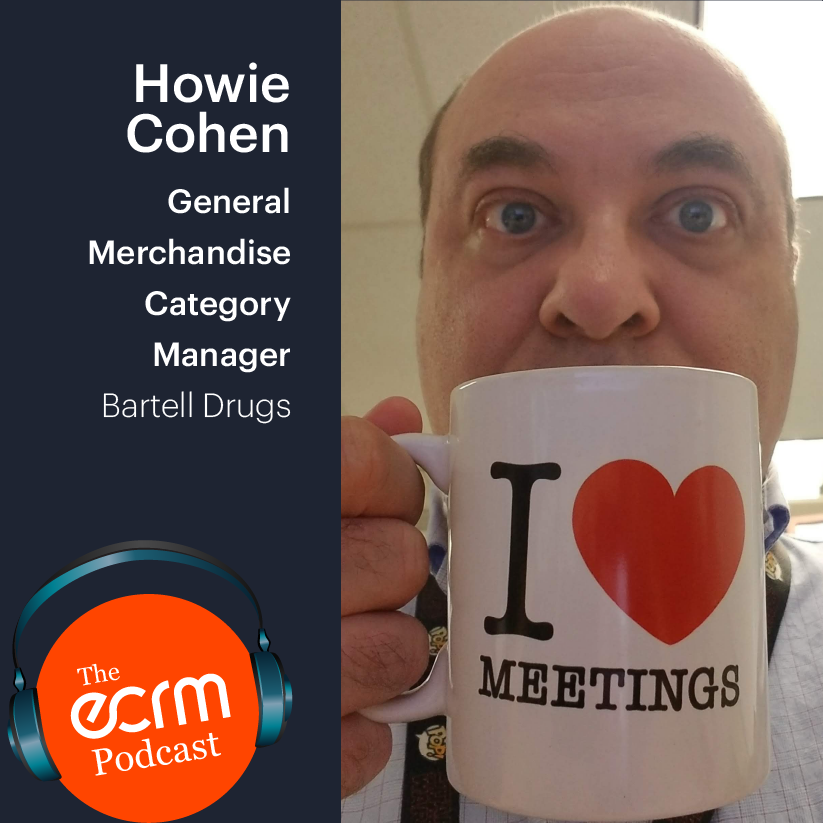Q&A: Bartell Drugs General Merchandise Category Manager Howie Cohen 6/16/2020
 During the initial phase of the pandemic, “essential items” were considered to be things like food, hand sanitizer and of course, toilet paper. But as the stay-at-home orders began to span months, consumers’ definition of what was essential has shifted. Now it includes products that keep us occupied, products that help us to work and learn from home, and products that help us to prepare meals. And many of these products fall under the general merchandise umbrella.
During the initial phase of the pandemic, “essential items” were considered to be things like food, hand sanitizer and of course, toilet paper. But as the stay-at-home orders began to span months, consumers’ definition of what was essential has shifted. Now it includes products that keep us occupied, products that help us to work and learn from home, and products that help us to prepare meals. And many of these products fall under the general merchandise umbrella.
In this podcast, ECRM VP of Content Joseph Tarnowski speaks with Howie Cohen, General Merchandise Category Manager for Bartell Drugs, about how their consumers' shopping activity around general merchandise has changed over the past few months. They also discuss how the stay-at-home orders have impacted Howie's day-to-day activities as a category manager, and the role virtual has played in them.
Bartell is a fourth-generation family-owned regional drug chain based out of Seattle with 67 locations around Puget sound, and has been serving its customers for 130 years. Howie has been with the company for 35 of those years, starting as a cashier. He’s been a category manager and down at the office for about 14 years.
Howie was also a participant in ECRM’s recent Pet Virtual Session, and he also discusses his experience in using the platform, which he refers as “best-in-class.” Below is an edited Q&A with Howie, along with the links to the full podcast and video interview.
Click here to see the full list of ECRM’s category-specific Virtual Sessions
Listen to the full podcast interview here (see the video below)
ECRM: How has the pandemic impacted the way consumers have been shopping your general merchandise category?
Cohen: I manage a fair number of categories here, and there has been a pretty dramatic shift in the customer's shopping behaviors. What people deem essential now is certainly a whole lot different than it was in February. One of my best category increases, for example, has been in what we call sporting goods, basically home exercise equipment. It’s not something we would have referred to as essential before, because many people just went to the gym, but with the gyms closed, now it's essential. So we saw triple digit increases going on for months now in that segment.
Same thing with pet. That's always been a terrific category for us and it's been doing well for it for years with solid growth. But since the virus hit, it has ramped up pretty dramatically and it's stayed up. So we've been having solid increases every month since the beginning of March. That's when you saw the panic buying on toilet paper, panic buying on food, and we saw the same panic buying on pet food just like any other groceries, as well as in hand sanitizers and cleaners. We didn’t see as much of a spike in pet supplies and toys, but the food and the treats just went through the roof in March and April as the stay-at-home orders hit.
We had pretty strict stay-at-home orders here in Washington. The store traffic dropped off massively from the March peak, but people would get more in their baskets, and they were much more deliberate in their trips; they'd come in and really stock up. We saw that again with pet food. It didn't really drop off that much from March, because even though there were fewer trips, they were still buying bigger baskets and getting more things. And if they were going to try something new, they put it in the basket while they were there in the store, so overall the volume has remained even as the traffic has been impacted.
ECRM: What about a pet toys and accessories?
Cohen: I would say it's not to the same degree that it is for humans. A large part of my life right now is dedicated to tracking orders of puzzles and board games. The corollary for the pets, we definitely saw an increase in pet toys since the virus hit, but just not as dramatically as we saw with food and with treats. And I'm not sure if this is reflecting our assortment or not, but cat toy sales have been a little stronger.
ECRM: Last year you were just getting ready to start with pet CBD. How's that going?
Cohen: It's been a great addition to the category. It’s a solid week-in, week-out performance. We're sort of finding our way with the right mix of products and the right mix of vendors, and that's been constantly changing over the year with vendors consolidation. I think the economic impact of the virus is going to very quickly shake out a whole lot of vendors in the category. So we'll see a lot of consolidation there and you'll get down to a much smaller group of important players in that category. For us, it's just about finding that right assortment, the mix between biscuits and soft chews and tinctures and all the different delivery methods that we have on the shelf, and then really watching the seasonality of it too.
Like everything else, you get a lift in the holidays. We had a lot of messaging around dealing with the stress of the holidays. That will be even more true this year with all of the virus worries on top of that. There'll be a lot of added stresses and CBD will definitely be one thing people turn to for addressing that for their pets as well. What surprised me the most though, was how big July 4th was. July 4th is the Christmas of the pet CBD world. We were expecting it to be a big deal, but it was still bigger than we expected.
ECRM: How far in advance before July 4th does that start peaking?
Cohen: It really starts about a week out before it really gets noticeable, but it's like everything else for seasonal, people always think they're prepared and then shop at the last minute. July 3rd and 4th were the huge days. Those two days were about 40% of the volume for the two week period. What you see at Christmas with gift cards on December 23rd and December 24th, that's what the pet CBD category does on July 3rd and July 4th.
ECRM: How has the pandemic impacted other GM categories?
Cohen: Well, the obvious ones are cleaners and toilet paper, household papers are through the roof and cleaners are through the roof and everything's on allocation. So getting product is a challenge and we’re trying to be a bit scrappy and find alternate sources for products. We have local wineries here in Washington and distilleries that converted to hand sanitizer. So I have these beautiful wine bottles full of both a surface and hand sanitizer that are showing terrific sales while supporting another local family owned business. Puzzles and games are huge. Trying to get puzzles is crazy; It's like toilet paper. The demand is off the charts. Everybody's allocated, and trying to find people that have product they can ship has been a challenge.
Within housewares, anything for home cooking and home food prep is up. And I don't know if this is because we're in the Seattle area, but my coffee supplies are kind of off the charts. People are making coffee at home. Small appliances are up. We sell SodaStream, and it has been extremely strong and people at home are going through a lot more carbonators.
We brought in some home school supplies as well when the schools shut down in March. We actually had a plan of that already set to go a couple of months later and we just moved it up by a few months. We put them all on Instagram right away and they have been very popular products for home delivery via Instacart or Amazon Prime Now.
ECRM: Looks like we will all be working at home for a while.
Cohen: We see that too. More than likely we are going to extend stay-at-home orders. Our office stay-at-home request has been extended through labor day. So the office is open if you need to go in there with all the various social discipline guidelines in place, but the request is for people to work from home through labor day now, and then we'll reevaluate at that time.
ECRM: Speaking of stay-at-home orders, how has the working remote impacted your role your day to day?
Cohen: It hasn't been too difficult for me. I've got a little home office set up here, and an old TV that I pulled out of storage and plugged in as a second monitor, and my office phone forwarded to my cell phone and it's all good. I do regular web meetings and it really hasn't been too difficult. My favorite part is, I’m a bit of a vinyl junkie, so I've got my record player on my desk too. I can't play my records at work in my cubicle, so I'm really enjoying pulling out some vintage vinyl or some new vinyl and listening to it while I'm working.
ECRM: How was your overall experience with the virtual sessions?
Cohen: Well in general, I'd say, I love it. I was I was very happy with how it worked. I have done a couple other virtual meetings and trade shows, and the ECRM set up by far is best-in-class. It was really great. I’m wow’ed at how you put it together so quickly. First of all, preparation was pretty much the same as a normal session. I didn't really didn't do much different reviewing the suppliers, taking a look through the products that they are going to offer. For the meetings themselves, generally what I do is, if they had uploaded a presentation, I’d throw it on my second screen so I had it in a giant, easy to read font. And then I would just talk to them and watch the presentation while looking at the second screen presentation. I also liked being able to have the second screen open for notes and reviewing past notes.
There were occasional bandwidth issues with some of the vendors; it wasn't too bad, but it came up occasionally. I only had one meeting out of 15 hours of meetings that really had any significant issues. And an ECRM staff member jumped in immediately and suggested some quick troubleshooting on refreshing the screen, which worked just fine and we were back in and onto the meeting. So it was resolved very quickly. It was nice to see that help jump in as quickly as they did.
Some of the vendors wanted to just hold products up to their camera, and that’s pretty tough. That doesn't really work as well in the virtual world as it does in-person. Having the products either in the presentation or uploaded through RangeMe, or where you can look at the products on the sidebar is definitely the best way for a vendor to do it. This way I can click on that and see it as they walk me through them.
ECRM: Which tools did you use on the platform?
Cohen: Notes was the tool I used most. I'll take a fair amount of notes during a meeting. And the ability to pull up the past notes, including notes from other shows where maybe I didn't go, but one of my coworkers went to, was helpful. For example, I saw the notes from the supplier’s meeting with the pharmacy team and I thought, “this is good to see who they've talked to earlier and what they talked about.” I love that ability. So note taking is number one for me.
I really liked having all the information that the vendors uploaded right on the screen. If they've uploaded one-sheets or a presentation, I like having that right there on the side screen that I can bring up as needed. Some vendors did a great job of uploading products, and others left it blank. So I definitely recommend that everybody put their products in there; it makes it much easier for me if I can pull them up and request the samples.
ECRM: How has virtual impacted your efficiency?
Cohen: There's definitely a big benefit for me not traveling. A lot of shows tend to be a central or East coast, and it's hours out of my day between getting to the airport, flying down, getting to the hotel, and unpacking. There’s a whole day that's generally lost in travel. With this virtual session, I'm going from a normal work day meeting to a session seconds later. So there's a really big efficiency in there for me. It will give me the ability to do more of these virtual shows that I normally wouldn't be able to attend in-person. So I'm pretty excited about that capability to see some more stuff that I wouldn't normally see because my schedule wouldn’t allow it.
ECRM: Where do you see virtual playing a role in the future?
Cohen: I see virtual remaining an important part of the mix. Obviously, you're still going to have in-person shows. There's some networking benefits there, whether you're just sitting around at dinner, talking and meeting some new people that way; you meet other retailers and other vendors just at lunch sometimes, and where you're listening to an educational presentation, things like that are great. But I think you'll see more of the virtual shows taking the place for time efficiencies or budget efficiencies. Travel budgets are always a real thing you have to deal with. I've only got so many dollars to spend on my travel budget, and so the virtual world replaced a lot of those because there's not going to be a cost. So I'll be able to do more and see more new vendors and new products without the impact on the travel budget. It'll definitely stay a part of it after the virus has gone.


Tony can be reached at (440) 528-0416